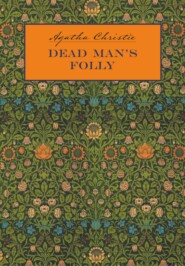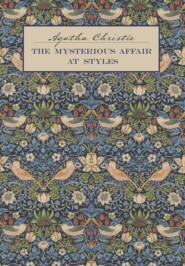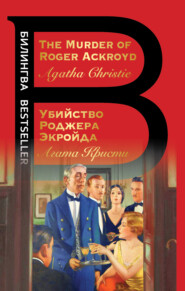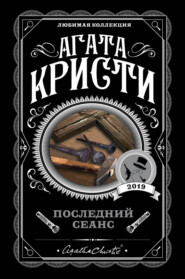По всем вопросам обращайтесь на: info@litportal.ru
(©) 2003-2024.
✖
Closed Casket: The New Hercule Poirot Mystery
Автор
Год написания книги
2019
Настройки чтения
Размер шрифта
Высота строк
Поля
‘The stuffed head of a leopard cub—the handiwork of Harry, Viscount Playford. He is a practitioner of taxidermy.’ Poirot frowned and added, ‘An enthusiastic one, who tries to persuade strangers that no other hobby is likely to provide the same satisfaction.’
‘So the deer’s head in the hall must be his too,’ I said.
‘I told him I do not have the necessary implements or knowledge for the stuffing of animals. He said I would need only some wire, a penknife, needle and thread, hemp and arsenic. I thought it judicious not to tell him that I would also need not to find the idea repellent.’
I smiled. ‘A hobby involving arsenic would hardly appeal to a detective who has solved murders caused by that very poison.’
‘This is what I want to talk to you about, mon ami. Death. Viscount Playford’s hobby is one that is all about the dead. Animals, not people—but they are still dead.’
‘Assuredly. I don’t see what the relevance is, though.’
‘You remember the name Joseph Scotcher—I mentioned it a moment ago.’
‘Lady Playford’s secretary, yes?’
‘He is dying. From Bright’s disease of the kidneys. That is why the nurse, Sophie Bourlet, lives here—to tend to his needs as an invalid.’
‘I see. So the secretary and the nurse both live at Lillieoak?’
Poirot nodded. ‘Now we have three people gathered here who, one way or another, are involved closely with death. And then there is you, Catchpool. And me. We both have encountered many cases of violent death in the course of our work. Mr Randall Kimpton, who plans to marry Claudia Playford—what work do you think he does?’
‘Does it involve death? Is he an undertaker? A chiseller of gravestones?’
‘He is a pathologist for the police in the county of Oxfordshire. He too works closely with death. Eh bien, do you wish to ask me about Mr Gathercole and Mr Rolfe?’
‘No need. Lawyers deal with the affairs of the dead every day.’
‘That is particularly true of the firm of Gathercole and Rolfe, which is well known for its specialism: the estates and testamentary dispositions of the wealthy. Catchpool, surely you see by now?’
‘And what of Claudia Playford and Dorro, the Viscount’s wife? What are their connections to death? Does one of them slaughter livestock while the other embalms corpses?’
‘You joke about this,’ said Poirot gravely. ‘You do not think it is interesting that so many people with a particular interest in death, either private or professional, are gathered here at Lillieoak at the same time? Me, I would like to know what Lady Playford has in mind. I cannot believe it is accidental.’
‘Well, she might have some sort of game planned for after dinner. Being a writer of mysteries, I imagine she wants to keep us all in suspense. You did not answer my question about Dorro and Claudia.’
‘I can think of nothing appropriate to our theme that applies to them,’ Poirot admitted after a moment.
‘Then I call it a coincidence! Now, if I’m to wash my face and hands before dinner—’
‘Why do you avoid me, mon ami?’
I stopped inches from the door. It had been foolish of me to suppose that, since he had not mentioned it at once, he would not raise the matter at all.
‘I thought you and I were les bons amis.’
‘We are. I have been confoundedly busy, Poirot.’
‘Ah, busy! You would like me to believe that is all it is.’
I glanced towards the door. ‘I am going to track down that silent butler and threaten him with all manner of mutiny if he does not show me to my room immediately,’ I muttered.
‘You Englishmen! However strong the emotion, however fierce the fury, stronger still is the desire to smother it, to pretend it was never there at all.’
At that moment the door opened and a woman of between—at a guess—thirty and thirty-five walked in, wearing a sequined green dress and a white stole. In fact, she did not so much walk as slink in, making me think instantly of a cat on the prowl. There was a supercilious air about her, as if walking into a room in an ordinary fashion would be beneath her. She seemed to be using every movement of her body to indicate her superiority over whomever else happened to be in the vicinity—in this instance, Poirot and me.
She was also almost unnaturally beautiful: exquisitely arranged hair of a rich brown colour, a perfect oval of a face, mischievous cat-like brown eyes with thick lashes, shapely eyebrows, and cheekbones as sharp as knives. She was an impressive sight to behold, and obviously aware of her charms. There was also a viciousness about her that communicated itself before she had spoken a word.
‘Oh,’ she said, hand on hip. ‘I see. Guests, but no drinks. Would that it were the other way round! I suppose I am early.’
Poirot rose to his feet and introduced himself, and then me. I shook the woman’s chilly, elegant hand.
She did not respond with a ‘Delighted to meet you’ or anything of that sort. ‘I am Claudia Playford. Daughter of the famous novelist, sister of Viscount Playford. Older sister, as it happens. The title landed on my younger brother and not me, simply because he is a man. Where is the sense in that? I would make a far better viscount than him. Frankly, a buttered teacake would make a better viscount than Harry. Well? Do you think it’s fair?’
‘I have never given it any thought,’ I said truthfully.
She turned to Poirot. ‘What about you?’
‘If you were to have the title immediately, would you then say, “Now that I have what I want, I am completely happy and content?”’
Claudia raised her chin haughtily. ‘I would say no such thing, for fear of sounding like a silly child from a fairy tale. Besides, who says I am unhappy? I am very happy, and I was talking not about contentment but about what is fair. Are you not supposed to have a brilliant mind, Monsieur Poirot? Perhaps you left it in London.’
‘No, it travelled with me, mademoiselle. And if you are one of the few people in this world who can sincerely say, “I am very happy”, then I promise you this: life has been fairer to you than it has to most people.’
She scowled. ‘I was talking about me and my brother and nobody else. If you cared about playing fair, you would confine your assessment of the situation to the two of us. Instead, you sneakily introduce a nameless crowd of thousands to support your argument—because you know you can win only by distortion!’
The door opened again and a dark-haired man entered, dressed for dinner. Claudia clasped her hands together and sighed rapturously, as if she had feared he might not arrive but here he was, to save her from some terrible fate. ‘Darling!’
The contrast between her demeanour now and her rudeness to me and Poirot could not have been greater.
The newcomer was handsome and clean-cut, with a ready and engaging smile and almost-black hair that fell over his forehead on one side. ‘There you are, dearest one!’ he said as Claudia ran into his embrace. ‘I have been looking everywhere for you.’ He had the most perfect teeth I had ever seen. It was hard to believe that they grew naturally in his mouth. ‘And here, by the look of it, are some of our guests—how marvellous! Welcome, one and all.’
‘You are in no position to welcome anybody, darling,’ Claudia told him with mock sternness. ‘You are a guest too, remember.’
‘Let’s say I did it on your behalf, then.’
‘Impossible. I should have said something quite different.’
‘You have been saying it most eloquently, mademoiselle,’ Poirot reminded her.
‘Have you been divinely beastly to them, dearest one? Take no notice of her, gentlemen.’ He extended his hand. ‘Kimpton. Dr Randall Kimpton. Pleasure to meet you both.’ He had a remarkable manner when speaking—so much so that I noticed it straight away, and I am sure Poirot did too. Kimpton’s eyes seemed to flare and subside as his lips moved. These wide-eyed flares were only seconds apart, and appeared to want to convey enthusiastic emphasis. One was left with the impression that every third or fourth word he uttered was a source of delight to him.
I could have sworn that Poirot had told me Claudia’s chap was American. There was no trace of an accent, or at least not one that I could detect. As I was thinking this, Poirot said, ‘It is a great pleasure to make your acquaintance, Dr Kimpton. But … Lady Playford told me that you were from Boston in America?’
‘Indeed I am. I expect you mean that I don’t sound American. Well, I should hope not! I took the opportunity to divest myself of all the unsavoury trappings the moment I landed at the University of Oxford. It doesn’t do to sound anything but English at Oxford, you know.’
‘Randall has a talent for divesting himself of trappings, don’t you, darling?’ said Claudia rather sharply.
‘What? Oh!’ Kimpton looked unhappy. His demeanour had completely changed. So had hers, for that matter. She stared at him as might a schoolteacher at a disobedient pupil, apparently waiting for him to speak. Finally he said quietly, ‘Dearest one, do not break my heart by reminding me of my most reprehensible mistake. Gentlemen, I was once, momentarily, foolish enough—having gone to great lengths to persuade this extraordinary woman to become my wife—I was foolish enough to doubt my own wishes and—’

















